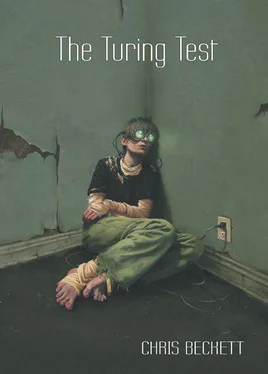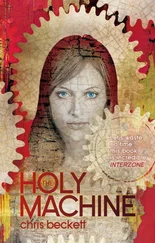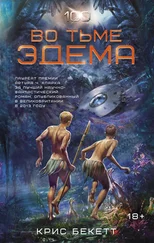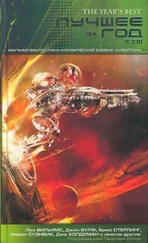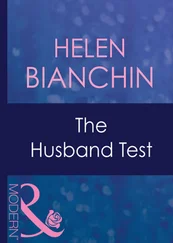Крис Бекетт - The Turing Test
Здесь есть возможность читать онлайн «Крис Бекетт - The Turing Test» весь текст электронной книги совершенно бесплатно (целиком полную версию без сокращений). В некоторых случаях можно слушать аудио, скачать через торрент в формате fb2 и присутствует краткое содержание. Город: Norwich, Год выпуска: 2008, ISBN: 2008, Издательство: Elastic Press, Жанр: Фантастика и фэнтези, на английском языке. Описание произведения, (предисловие) а так же отзывы посетителей доступны на портале библиотеки ЛибКат.
- Название:The Turing Test
- Автор:
- Издательство:Elastic Press
- Жанр:
- Год:2008
- Город:Norwich
- ISBN:978-0-9553181-8-4
- Рейтинг книги:4 / 5. Голосов: 1
-
Избранное:Добавить в избранное
- Отзывы:
-
Ваша оценка:
- 80
- 1
- 2
- 3
- 4
- 5
The Turing Test: краткое содержание, описание и аннотация
Предлагаем к чтению аннотацию, описание, краткое содержание или предисловие (зависит от того, что написал сам автор книги «The Turing Test»). Если вы не нашли необходимую информацию о книге — напишите в комментариях, мы постараемся отыскать её.
Literary Awards: Edge Hill Short Story Prize (2009).
The Turing Test — читать онлайн бесплатно полную книгу (весь текст) целиком
Ниже представлен текст книги, разбитый по страницам. Система сохранения места последней прочитанной страницы, позволяет с удобством читать онлайн бесплатно книгу «The Turing Test», без необходимости каждый раз заново искать на чём Вы остановились. Поставьте закладку, и сможете в любой момент перейти на страницу, на которой закончили чтение.
Интервал:
Закладка:
Kara told me later that at least she would be able to be with her mother now.
Here are some more kids going in. You can see their foster-parents anxiously wishing them luck. Then the door closes.
I waited outside. It’s a nice spot. This is the view over the plain. Even from the foot of the Motherhouse there’s a good view in several directions. It must be wonderful from the top. And look at the balloons from the bowava trees. The wet season has been and gone and the sky is starting to fill up with them. Wanderers, the Apiranians often call them, merthi, just like the men. Have I mentioned that already?
Yes, it is bleak out there on the plain. Bleak and windy and dry.
Now, here they are coming out again. Haven’t they changed? Kara has been told that in another month she’ll be moving in there. And when that happens, Karl and the other boys of his age will be turned out onto the plain with a mootha or two and some provisions, and an exhortation to respect all Mothers and never besmirch the reputation of Formara, though they are never ever to return there.
Look at the strain in their faces. The others are crowding around them trying to make a fuss of them but Karl and Kara are far, far away. Another month and they’ll have to say goodbye to each other and never meet again.
What’s this? Oh it’s that mouse on the gear wheel just before… (Why did you take that picture Lydia, for goodness sake?)
Now look at these balloons. It’s an Apiranian custom after the Tukanza. Bunnoo and Thrompin gathered them from a bowava tree (not an easy thing to do!) and they gave them to Karl and Kara to release them from the square in front of the Motherhouse.
Here they are look, Karl and Kara releasing them one by one, while all the others watch and cheer. Look at their balloons going up into the sky, to join all the others that are blowing past.
Look: a couple quite low and then three more – can you see them? – high, high up among the clouds.
More drinks anyone? Are you hungry? Would you like anything else to eat?
We’ve got some pictures from our trip to Pazzazza up in the Pleiades that we haven’t shown you.
Now that was something really special.
Piccadilly Circus
Clarissa Fall is heading for central London to see the lights, bumping along the potholed roads at five miles an hour in her electric invalid car, oblivious to the honking horns, the cars queuing behind her, the angry shouts. How many times has she been warned? How many times has she been humiliated? But she must see the lights.
“When I was a little girl there were still physical lights in Piccadilly Circus,” she’s telling everyone she can. “I remember my father taking me. They were the most wonderful thing I’d ever seen.”
She’d always been odd. There was that business when she cut holes in the wildlife fence to let the animals into the city. There were those young consensual tearaways she used to insist on bringing home. But things really started getting bad when her husband Terence died, leaving her alone in that big old house by the perimeter, that big fake chateau with its empty fountains and those icy lights that lit it up at night like Dracula’s castle. I suppose it was loneliness, though when Terence was alive he and Clarissa never seemed to do anything but fight.
“I am two hundred years old, you know,” she kept saying now. “I am the very last physical human being in London.”
Neither of these was true, of course, but she was certainly very old and it was certainly the case that she could go for days and even weeks without seeing another physical person. There really weren’t many of us left by now and most of us had congregated for mutual support in a couple of clusters in the South London suburbs. No one lived within five miles of Clarissa’s phoney chateau on the northern perimeter and no one was much inclined to go and see her. She’d always been histrionic, now she was downright crazy. What’s more – and most of us found this particularly unforgivable – she drew unwelcome attention onto us physicals, not only from the consensuals, who already dislike us and call us ‘Outsiders’ and ‘spooks’, but also from the hidden authorities in the Hub.
Her trouble was that she didn’t really feel at home in either world, physical or consensual. The stiff arthritic dignity of the physicals repelled her. She thought us stuffy and smug and she despised our assumption that our own experience was uniquely authentic and true.
“Would you rather the world itself ended than admit the possibility that there may be other kinds of life apart from ours?” she once demanded.
But really, although she always insisted to us that it wasn’t so, she was equally disgusted by the superficiality of the consensuals, their uncritical willingness to accept as real whatever the Hub chose to serve up, their lack of curiosity, their wilful ignorance of where they came from or what they really were. While she might criticise us physicals, she never seriously considered the possibility of giving up her own physical being and joining the consensuals with their constructed virtual bodies. And this meant that she would still always be an Outsider to them.
She may have felt at home with no one but she became a nuisance to everyone – physical and consensual – as a result of her forays into the city. At first she went on foot. Then, when she became too frail, she got hold of that little invalid car, a vehicle which the consensuals of North London would soon come to know and hate. Bumping slowly along the crumbling physical roads she would switch off her Field implant so as not to be deceived by the smooth virtual surface, but this meant that she couldn’t see or hear the consensual traffic going by either. She could see only the empty buildings and the cracked and pockmarked empty road. Consensual drivers just had to cope as best they could with her wanderings back and forth.
When she parked her car, though, she always turned her implant on again. This of course instantly transformed empty ruined physical London into the lively metropolis that was the Urban Consensual Field, a virtual city in imitation of London as it once was, superimposed by the Hub over what London had become. Clarissa could still just remember those old days: the crowds, the fumes, the lights, the noise, the hectic life of a city in which, bizarrely, it still seemed feasible for millions of physical human beings to casually consume what they wanted of the physical world’s resources, and casually discard what they didn’t. And she craved that bustle and that life, she craved it desperately.
We all had Field implants of course. They were a necessity for dealing with a civilisation that had become, whether we liked it or not, primarily digital. Spliced into our nervous system, they allowed consensual constructs to be superimposed over our perceptions of the physical world, so that we could see the same world that the consensuals saw, hear what they heard and, to a limited degree, touch what they touched. The rest of us invariably took the position that we didn’t like having to deal with the consensual world, but it was sometimes a necessary evil. But for Clarissa it was different. When she switched on her implant it just wasn’t a matter of practical necessity for her, it was more like injecting heroin into an artery. All at once there were people all around her, there was life, there were shop windows and market stalls piled high with colourful merchandise, and the dizzying suddenness of it was like the hit of a powerful drug.
But her addiction wasn’t so much to the Field itself as to the moment of crossing over. After that first moment the experience never quite lived up to its initial promise, for however hard Clarissa tried, the consensual world shut her out. And she did try. She spent hours in the consensual city outside shops and in parks and on street corners making rather pathetic efforts to engage people in conversation, but most people avoided her and some made no secret of their contempt. It was true that a few kind souls suppressed their revulsion at her age and her physicality and briefly allowed her the illusion that she had made a friend, but it was only out of kindness. Even apart from being an Outsider she really wasn’t very good company anyway. She talked too much; she didn’t listen; and, what was worse, however much she might criticise her fellow Outsiders for our existential snobbery, she herself was as much of a snob as any of us and a lot less inhibited about it. She could never resist pointing out to consensuals the shallow and illusory nature of their existence:
Читать дальшеИнтервал:
Закладка:
Похожие книги на «The Turing Test»
Представляем Вашему вниманию похожие книги на «The Turing Test» списком для выбора. Мы отобрали схожую по названию и смыслу литературу в надежде предоставить читателям больше вариантов отыскать новые, интересные, ещё непрочитанные произведения.
Обсуждение, отзывы о книге «The Turing Test» и просто собственные мнения читателей. Оставьте ваши комментарии, напишите, что Вы думаете о произведении, его смысле или главных героях. Укажите что конкретно понравилось, а что нет, и почему Вы так считаете.
